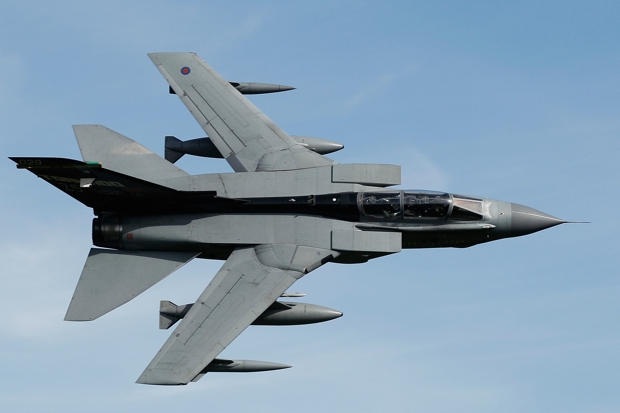A few weeks ago, Boris Johnson posed a question in his residents’ survey for the Uxbridge and South Ruislip constituency. ‘Which issues are most important for the country as a whole?’ Fifteen subjects were offered for consideration. Not one mentioned defence or security, despite the threatening global scene.
There is an election in May. The major parties are competing in the great NHS give-away whilst showing every sign of wishing to bury defence until well after the election, using the expected Strategic Defence and Security Review (SDSR-15) as the convenient touchstone for evasion.
Yet it is highly likely that this review will either be pushed into 2016, or again prove unfit for purpose. Consider the view of Sir Peter Luff, the former defence equipment minister, in a recent article:
‘The coalition plans to cut defence spending still further… despite the world being more dangerous than it has been for decades. At a time when we should be more open than ever with the British people about the scale of the dangers we face, a behind- the- doors SDSR, driven once again by the importance of the deficit reduction, risks the state turning its back on effective security almost by accident.’
So who will speak for defence in an election year?
Take the Conservative party. In September, the Prime Minister used the Nato summit in Wales to chide Britain’s European allies and set the challenge to achieve defence budgets equivalent to the Nato minimum of 2 per cent of GDP by 2020. Yet many experts already suggest that by 2018 Britain will be heading in the opposite direction, spending only 1.7 per cent of our GDP on defence. Will Cameron raise the subject? Philip Hammond, the last defence secretary, left the MOD with major capability deficiencies and two consecutive years of underspend, £3.4bn according to reports. He will not wish to raise the subject. Michael Fallon, his successor, has stood up for the armed forces’ share of government funding; will he get much airtime?
What of the opposition? Ed Miliband in his conference speech talked briefly about ‘our brilliant, heroic armed forces’ and then forgot them in all that followed, along with the deficit. Will the shadow defence secretary get much airtime in the election run-up? Highly unlikely. Burying defence until after the election will suit the Labour party too.
Nick Clegg in his conference speech also paid early tribute to the armed forces – and then he too said nothing thereafter. And the SNP whose interest in defence is largely confined to removing the nuclear deterrent from Scotland, indeed the United Kingdom, are unlikely to have anything worthwhile to say.
Does it matter? Yes it does. Many credible correspondents are highlighting the risks we run by our neglect of the nation’s defences. The daily evidence is on our TV screens, with news reports from Ukraine, Crimea, Syria, Iraq, Iran, Pakistan, Nigeria, Somalia, and North Korea. Indeed, our politicians in recent years have all recognised the growing dangers around the globe.
Tony Blair, as he departed, David Cameron, Nick Clegg and William Hague have all spoken on this. Even the Chancellor, George Osborne, when questioned on defence cuts by Andrew Marr immediately after the Nato summit last year, replied ‘We can afford whatever it takes to provide adequate security. Defence comes first.’
This last soundbite is particularly revealing because it confirms what we in the UK National Defence Association and others have been saying for several years now – that sound defence is affordable. It is a matter of choice. But successive governments have continually chosen to relegate defence in the list of funding priorities.
As a result the UK armed forces’ fighting power has been massively reduced. Indeed, the House of Commons Defence Committee have suggested that there has been a halving of fighting power since 2010 – and this without considering the serious reductions in the previous decade.
Consider the glaring gaps in our capabilities. No maritime patrol aircraft, loss of combat power in the Royal Navy, just three squadrons of Tornado ground attack aircraft to conduct the nation’s operations, and major manpower weaknesses. Most critically, we cannot continue to deny our loss of credibility with the United States following our failures in Basra and Helmand. The evidence is there in books and interviews from our own people, and increasingly from the Americans. The recent book by Jack Fairweather reviewed by Max Hastings makes sad reading for those brought up in the period of mutual respect and co-operation.
So who will speak for defence?
Not, it would seem, many of that generation for whom peace is somehow the natural order of things in the 21st century, although how they came to believe that is not clear. Nor those who appear to believe, as an article of faith, that soft power can substitute for hard power, and that history has nothing to teach us. Try telling that to Putin and Isis; look at the impending lease of Russian fighters and bombers to Argentina.
Commentators of note will try to raise the debate away from short-termism and its giveaway culture. But honest debate will be difficult in the face of a wall of silence, and it is only the politicians who can respond.
Who really will speak for defence in 2015? Answer came there none.






Comments